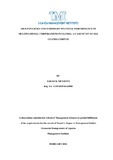| dc.contributor.author | Mugenyi, Sarah. K. | |
| dc.date.accessioned | 2020-09-10T21:22:22Z | |
| dc.date.available | 2020-09-10T21:22:22Z | |
| dc.date.issued | 2014-02 | |
| dc.identifier.citation | Mugenyi, Sarah. K. (2014) Group policies and subsidiary financial performance of Multinational Corporations in Uganda: A case study of SGS Uganda Limited | en_US |
| dc.identifier.uri | https://hdl.handle.net/20.500.12305/891 | |
| dc.description | A dissertation submitted to the School of Business and Management in Partial Fulfilment of the Requirements for the Award of a Master’s Degree in Management Studies (Financial Management) of Uganda Management Institute | en_US |
| dc.description.abstract | The study was about group policies and subsidiary financial performance of multinational
corporations in Uganda with a focus on SGS Uganda Limited. The purpose of the study
was to establish the effect of group policies on the subsidiary financial performance, a
case study of SGS Uganda Limited. The following objectives guided the study: 1) To
examine the effect of group control policy on the subsidiary financial performance, 2) To
examine the effect of group risk management policy on the subsidiary financial
performance and 3) To establish the effect of group shared cost policy on the subsidiary
financial performance. Thus, the following research questions were answered: 1) What is
the effect of group control policy on the subsidiary financial performance? 2) What is the
effect of group risk management policy on the subsidiary financial performance? 3) What
is the effect of group shared cost policy on the subsidiary financial performance? The
research design was a case study of SGS Uganda Limited. The sample size that was
selected was 68 but the response was 61. Analysis involved descriptive statistics
(frequencies and percentages) and the second included inferential statistics (correlations
and coefficient of determination). Findings revealed a weak negative relationship (rho =
-.292) between group control policy and subsidiary financial performance, a weak
negative relationship (r = -.287) between group risk management policy and subsidiary
financial performance and a weak negative relationship (r = -.396) between group shared
cost policy and subsidiary financial performance. Thus, it was concluded that group
policies significantly affected subsidiary financial performance. It is recommended that
SGS SA give more autonomy to SGS Uganda Limited’s group control policy, group risk
management policy and group shared cost policy for SGS Uganda Limited’s to improve
on its financial performance. | en_US |
| dc.language.iso | en | en_US |
| dc.publisher | Uganda Management Institute | en_US |
| dc.subject | Group policies | en_US |
| dc.subject | Subsidiary Financial Performance | en_US |
| dc.subject | Multinational Corporations | en_US |
| dc.subject | SGS Uganda Limited | en_US |
| dc.subject | Uganda | en_US |
| dc.title | Group policies and subsidiary financial performance of Multinational Corporations in Uganda: A case study of SGS Uganda Limited | en_US |
| dc.type | Thesis | en_US |

